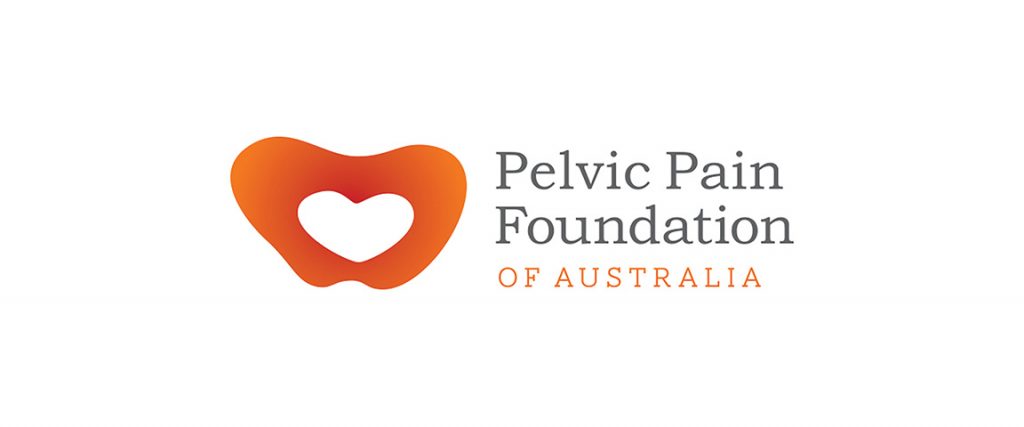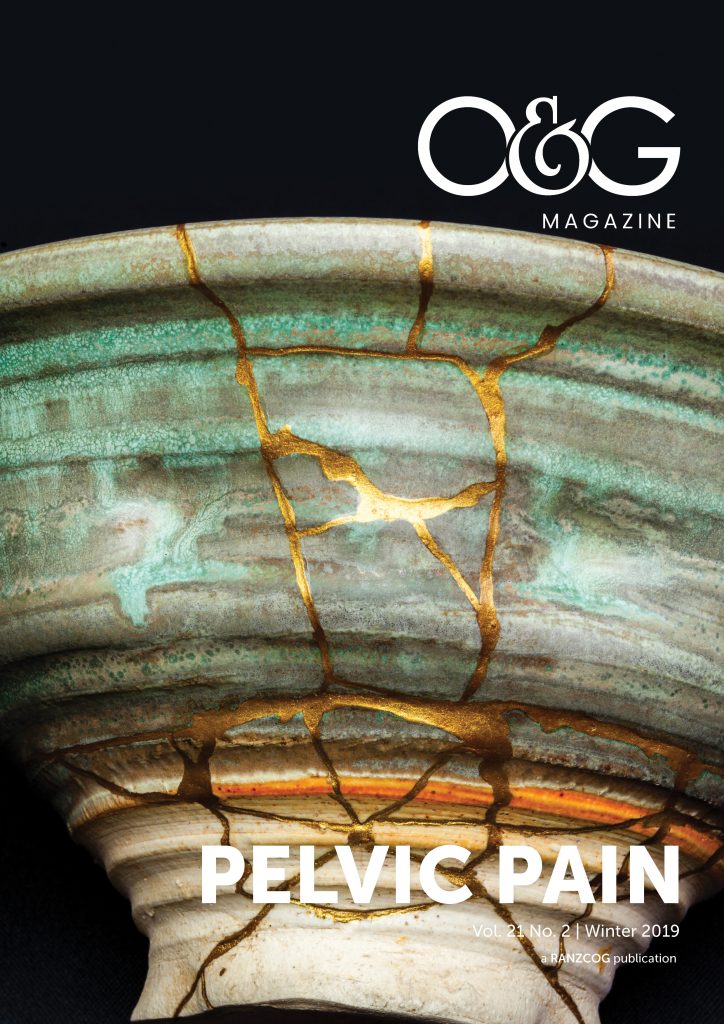The Pelvic Pain Foundation of Australia (PPFA) is a not-for-profit organisation that promotes and supports education, advocacy and research for girls, women and men with pelvic pain from any cause. While dysmenorrhea-related pain is a significant proportion of our work, we also recognise the difficulties that Australians, both male and female, with other pelvic pain conditions have in accessing reliable, medically accurate and practical information. A key part of our work is in the support of clinicians, including gynaecologists, when caring for the complex needs of women with pain. Solutions for pelvic pain need to work for both sides of the consulting desk.
The origins of PPFA
PPFA was co-founded in January 2014 by Dr Susan Evans (gynaecologist, pain physician), Ms Kathy Allen (accountant), Ms Donna Benge (solicitor) and Dr Meredith Craigie (pain physician).
The need for representing those with pelvic pain was first recognised at the National Pain Summit held at Parliament House, Canberra in 2010. The Pain Summit was a turning point for Australians with chronic pain, and led to the development of Australia’s first National Pain Strategy; however, the needs of women with pelvic pain had not been addressed. No organisation was advocating on behalf of girls and women with pelvic pain.
In 2011, Ms Deborah Bush (Endometriosis New Zealand), Prof Thierry Vancaillie and Dr Susan Evans, in collaboration with PainAustralia and the Faculty of Pain Medicine, looked at ways of remedying this problem. For their report entitled ‘The $6 Billion Woman and the $600 Million Girl: The Pelvic Pain Report’ they consulted widely with health professionals and those affected by pelvic pain to outline the problems with current pelvic pain services and policies. Since then, the extent of pelvic pain in men has also been recognised. PPFA was formed to represent the interests of those with pelvic pain regardless of age, gender or pelvic pain condition.
PPFA’s achievements so far
Online education
The pelvicpain.org.au website provides information and education to all Australians, including those from rural, remote and international locations. The website focuses on practical information that patients can action themselves, or in consultation with their GP. Self-care and a better understanding of pain is emphasised. Patients can begin learning pelvic stretches, pelvic muscle relaxation, better use of medications and self-care from the first day of consultation.
Seminars
In May 2019, PPFA held its fourth Health Practitioner Training Seminar. These inexpensive and practical seminars welcome all AHPRA registered health professionals with an interest in broadening their pelvic pain management skills and building contacts across different professions. The speakers and topics are chosen to provide maximal practical application to everyday clinical care. The seminar allows professionals to upskill outside their traditional area of expertise, in a wide range of areas such as Understanding Pelvic Pain, The Management of Bowel Pain in Primary Care, Avoiding Burnout, Male Pelvic Pain, Laparoscopy for Pelvic Pain, Recognising Musculoskeletal Pelvic Pain, Opioids in Pelvic Pain, and Motivational interviewing.
Schools program
In 2019, PPFA is contracted to provide an innovative, neuroscience-based schools education program to 80 schools in South Australia (SA). In 2017, PPFA piloted the Endometriosis New Zealand, ME Program in 10 SA schools with great success, and presented an evaluation of the program to the Australian Pain Society. The PPFA-developed Periods, Pain and Endometriosis (PPEP-Talk) Program was created to accommodate the requirements of the Australian education system and incorporate new aspects of neuroscience for the benefit of all students. It explains pain, periods and endometriosis with a focus on positive health options to reduce pain, early effective management of dysmenorrhea in a primary care setting, and early referral for consideration of endometriosis where required. PPEP-Talk is part of the National Action Plan for Endometriosis (NAPE) and is funded as a collaboration between the federal government and the SA State Government. A pilot PPEP-Talk program will be provided in Queensland in 2019, and PPFA welcomes enquiries from other states.
Subscriber program
Health professionals who choose to become PPFA subscribers are supported in several ways. Subscribers are entitled to have their practice details available for the public on the website (optional) with a description of the specific services each practitioner provides, for example, laparoscopic surgery for endometriosis, physiotherapy for male pelvic pain, pain specialist and so on. They are entitled to use PPFA patient and teaching resources including the PPFA Pelvic Pain Questionnaire to facilitate history taking, the Introduction to Pelvic Pain booklet for patient pre-reading before consultations, and view specific pelvic pain training videos to improve their management skills. Subscribers are also supported where they encounter difficulties when caring for their patients, where possible.
Patient resources
PPFA provides products for girls, women and men through an online shop accessed via the pelvicpain.org.au website. Products include Dr Patricia Neumann’s pelvic muscle relaxation audio (male and female), Ms Meike Wise’s ‘This Endo Life’ book, Dr Susan Evans’s ‘Endometriosis and Pelvic Pain’ book (paperback and ebook), TENS machines for teens, Olive and Bee lube for sensitive vulval skin, vaginal trainers, Peter Dornan’s ‘Musculoskeletal approach to pelvic pain’ book, the Explain Pain ‘Protectometer workbook’, and health practitioner training videos for individual sale.
Collaboration with other groups
PPFA collaborates with a wide range of clinician organisations (Queensland Persistent Pelvic Pain Network, Pelvic Pain Victoria, Tasmanian Pelvic Pain group), advocacy groups (QENDO, Endometriosis Australia, EndoActive, EndoNet, EndoSupportSA, EndoHelp, the Endometriosis Perth Sisterhood), Womens Health Organisations (WHRIA, TRUE, Jean Hailes), research organisations (Robinson Research Institute) and several universities.
MBS Review advocacy
PPFA has actively engaged with the MBS Review Committee, seeking a new Medicare Item Number for prolonged consultations by gynaecologists when caring for women with pelvic pain. PPFA has advocated that a timed consultation remunerated at the same rate as physicians for patients with complex conditions would allow gynaecologists to provide more comprehensive care and incentivise upskilling in this area. PPFA’s submission to the MBS Review Board requesting this new item number was followed by the opportunity to meet for a long and comprehensive interview with Prof Bruce Robinson (Chair, MBS Review), and senior members of the Department of Health. We continue to advocate for this as an essential part of health reform.
NAPE
PPFA has been an active participant in the advocacy for, the preparation for, and the implementation of, the NAPE. The NAPE is an ambitious document, which, if fully implemented, has enormous potential to change the lives of girls and women with pelvic pain. It is a credit to the collaboration of Federal and State Governments with the five peak advocacy bodies that make up the Australian Coalition for Endometriosis (QENDO, Endometriosis Australia, EndoActive, Canberra Endometriosis Network and PPFA).
Research
PPFA has supported a wide range of research projects, either financially or with in-kind support. These include the development of a Pelvic Pain Impact Questionnaire, basic science research into the relationship between endometriosis lesions and pain, the continuing development of a home use tool for male pelvic muscle pain, and a large survey investigating the Language of Pelvic Pain.
PPFA provides items of news to the public that are perceived as contributing to readers’ lives in a positive and collaborative way.
What PPFA doesn’t do
PPFA does not provide consumer support, pelvic pain advice or services to individuals with pain.
How PPFA is funded
PPFA is led by a diverse and highly qualified volunteer board. The skill mix includes legal, accounting, journalism, marketing, education, gynaecology and pain medicine, supported by a part-time office administrator. Income is derived from the sale of online goods, training seminar registration fees, PPFA subscriber subscriptions and private donations. A 2019 grant from the Federal Department of Health and the SA State Government will support the PPEP-Talk Schools Program.
How you can support PPFA
PPFA’s foremost aim is to support clinicians wishing to improve the care they provide to girls, women and men with pelvic pain. We believe that the lack of a trained workforce willing to work in this area is the major impediment to improved services. You support the aims of PPFA most effectively by choosing to take up the challenge of improving your own pelvic pain management skills, and PPFA is ready to help you.
If you wish to support PPFA financially, donations to PPFA are tax-deductable. We are a highly cost-efficient organisation that supports an area close to your heart: women’s health. PPFA subscribers who wish to have their practice included on the PPFA website and access patient resources and training materials pay a subscriber fee of $200 per year or $450 for three years.
Summary
While all areas of healthcare have patients with complex pain needs, we suggest that in no area of medicine is this need more apparent than in pelvic pain. Much of the knowledge required to assist women with pain is already available. It crosses a range of traditional skillsets, requiring learning outside traditional comfort zones. Gynaecologists are already experts in endometriosis, menstrual and hormonal issues. The upskilling required to manage the majority of pelvic pain needs is relatively straightforward, and well within the ability of gynaecologists. PPFA looks forward to helping you increase the number of women that leave your care with less pain.






Leave a Reply